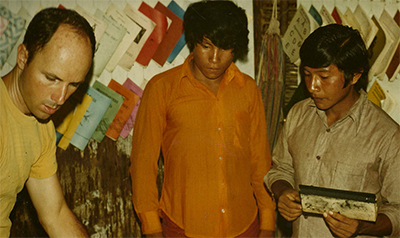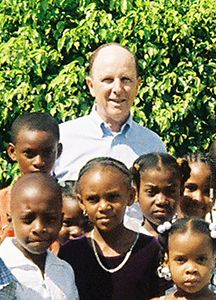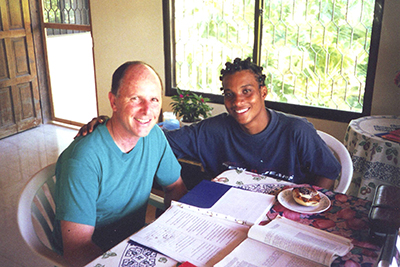Home > About > Our People > A Life in Translation
The seeds of Ron Metzger’s conversion came during his daily commute to college, and it completely, utterly transformed his life.
Raised in the Methodist Church in Annapolis, Maryland, Ron and his family believed that being “good” was good enough to get to heaven.
But then his older brother, Richard, began dating a Southern Baptist girl and attending church with her family, and he learned the Bible said something much different. During their daily commute to the University of Maryland in College Park, a trip that lasted about an hour each way, Richard “had me as a private audience,” Ron said. And he heard plenty.
“We believed that if we live a good life, if we do the best we can, that’s ‘goodness,’” said Ron, a long-time member of Prestonwood. “But my brother said only Jesus is ‘the goodness.’
“And I told him, ‘I’m going to start reading the Bible and I’ll prove you wrong.’”

God’s Word quickly set him right.
“It wasn’t John 3:16 that convinced me,” Ron said. “It was the account of Jesus’ Passion, what He did for us. I said, ‘Lord, Richard is right!’ I got on my knees and said, ‘God, there’s nothing good in me.’”
Soon, the young man who had prepared for a career in accounting and statistical control was on his way to Colombia, determined to carry the Good News to a tiny people group called the Carapana who lived deep in the Amazon basin. As part of Wycliffe Bible Translators, his ultimate aim was to provide them with a New Testament in their own language, a language that had no written form.
Perhaps 1,000 people in the world spoke Carapana, Ron said. He wasn’t one of them.
He arrived in Colombia in 1966, spent months in intensive study of Spanish and months more serving at Wycliffe’s office in Loma Linda, a small city in central Colombia. Then, finally, he flew into the jungle, almost to Brazil, to serve among the Carapana.
And each evening, he set off for the longhouse where the men gathered. He listened as they told stories and joked together, often about him, he said. But he soaked up the language, much as a baby does, learning to differentiate between the sounds and eventually the words and finally putting them together.
But that was only the first step. Carapana is a tonal language, and a slight change in inflection in a single letter can give a word an entirely different meaning.
“We had to find a way for them to associate letters with sounds,” Ron said, a painstaking process to create an alphabet that took 25 years to complete.
Ron served alone for the first two years. And then he met Lois, another missionary in Colombia who would become his wife.
“She was working in the mountains, near the Ecuadorian border. And as the Lord planned it, we got together,” he said. They married in 1969 and worked together among the Carapana people for more than 20 years, until 1993 when guerilla activity forced them to leave.
Colombia in the 1980s and ‘90s was far from safe, particularly for American missionaries.
“New Tribes lost five missionaries and the International Mission Board lost one and we lost one,” he said.
Chet Bitterman, a Wycliffe missionary, was captured by guerillas from the 19th of April Movement in Bogota in 1981 and later executed, Ron said. Another young missionary, Ray Rising, spent 810 days as a captive in the mid-‘90s.
At their base in the jungle, the Metzgers relied on small planes to deliver needed supplies. Security was paramount.
“Every time the airplane was scheduled to come, we had to take a big white sheet out [to the landing area] and if we stood in the middle of the sheet, the plane would come in,” Ron said. “Otherwise they’d just fly off.”

But in the ‘90s, guerilla activity intensified and the Metzgers were ordered back to Loma Linda, leaving the people they’d served. By then, though, they had completed and published the New Testament in Carapana, leaving that great gift with people they loved.
“Then we retooled,” Ron said.
Ron and Lois had the opportunity to teach an island group in the Caribbean, politically part of Colombia but with a native population that spoke an English Creole, reflecting the earliest settlers on San Andres, Providencia and Santa Catalina islands.
“This was a totally new ballgame,” Ron said. “We were working with 25,000 to 30,000 islanders. The liturgy was there, but we were working to create the (written) Creole language.”
Lois and Ron spent five years there before returning to the U.S., their New Testament in San Andres Islander Creole still incomplete.

“But God brought the Creole speakers” to Dallas, Ron said. “There are 30-odd Creole speakers here, so I could do the work here.”
The completed New Testament—“Di Nyuu Testiment ina San Andres Ailanda Kriol”—was recently published.
In 2008, Lois passed away and Ron lost his wife and his partner in life and Bible translation.
“We were back in the states, and she’d always had allergy problems so we thought it was allergies. But it went on and on,” Ron said. “We went to the doctor and he said this is lung cancer. She’d never smoked in her life.
“I don’t think it was even six months and she was gone.”
During their decades at Prestonwood—their home church while in America—the Metzgers were members of a Bible Fellowship taught by Bill Matthews.
And when Lois learned of her diagnosis, the class “went through the grieving process with them,” Bill said.
“God providentially worked so they came to our class and we’ve known them and loved them ever since,” he said.
When Ron retired from Wycliffe at the end of April, the class celebrated with him, long-time friends honoring him for his work in spreading the Gospel.
“I keep telling Ron that God has a lot of rewards for him up in heaven,” Bill said.
But even though he’s officially retired, Ron has some unfinished business.
Now that he’s completed the New Testament in San Andres Islander Creole, he has turned his attention to a Creole dictionary, which he’ll help edit.
“I’ve been doing editing forever and I know how Creole is written,” Ron said.
“And I want to make sure that all the words in the New Testament are in the dictionary, too.”
Published: September 22, 2016
Author: Michael Young
Como creyentes, estamos llamados a dar de nuestros talentos, no solo financieramente, sino también nuestros dones espirituales a través del voluntariado. Tenemos formas seguras de dar y oportunidades para bendecir a otros a través de donaciones de legado y una gran cantidad de oportunidades de voluntariado.

Simple y seguro. Dé una sola vez o de manera recurrente usando su cuenta de cheques, tarjeta de crédito o débito.
Dar Ahora

Prestonwood ofrece muchas maneras de usar sus dones y talentos para servir a los demás, desde camarógrafo hasta miembro del coro, técnico hasta maestro, asistente de estacionamiento hasta guerrero de oración. Haga clic aquí para obtener más información.
Más información
Donec elementum volutpat sem vel elementum. Sed sem iaculis tellus ac posuere efficitur.

Prestonwood.Live, el campus en línea de Prestonwood, busca cumplir con la misión de Prestonwood y llegar aquellos que necesitan a Jesús y no pueden asistir a uno de nuestros campus.
Visita Prestonwood.envivo

?Se perdió un servicio de adoración ? ?Quiere estar al tanto con una serie de sermons?
Haga clic aquí para ver los servicios.
Busque títulos o serie o navegue por fechas
Ver sermones
Para más información sobre nuestros ministerios en Prestonwood en Español, haga clic en los enlaces a continuación.

A través de nuestros Estudios Bíblicos de Grupos de Vida, grupos pequeños, cada persona que viene a Prestonwood tiene la oportunidad de construir relaciones clave que pueden durar toda la vida. Para más información
Encuentra un grupo
Somos una congregación dinámica, constituida por personas de la región del Norte de Texas, unidos con el propósito de adorar, estudiar la Palabra de Dios, trabajar en Su obra y alcanzar el mundo con el mensaje del Evangelio.

Valoramos como base seis áreas de la vida de nuestra iglesia. Juntos, estos valores compartidos identifican quiénes somos, nos animan a seguir hacia todo lo que deseamos lograr y nos unen en compañerismo.
Más información

La decisión más importante en su vida es si acepta o no a Jesús como su Señor y Salvador personal.
Más información
Sin importar a cuál campus asiste, encontrará caras sonrientes que le recibirán, una vibrante música de adoración que levantará su espíritu y una enseñanza poderosa basada en la Palabra de Dios que transformará su vida.

Se sentirá bienvenido desde el primer momento que visita Prestonwood. Tenemos algo para cada uno de su familia, permítanos ayudarle a planificar su primera visita.
Planifique su visita

Esta clase es crucial para ayudar a nuevos miembros y a aquellos que están considerando unirse a Prestonwood y los diferentes ministerios de nuestra iglesia.
Más información